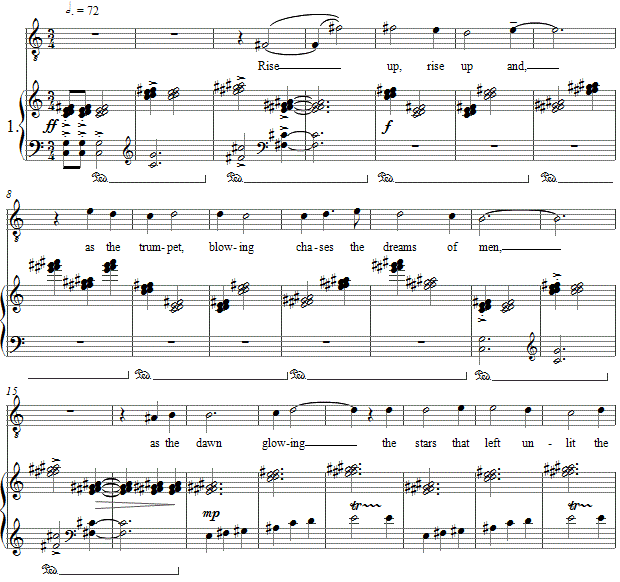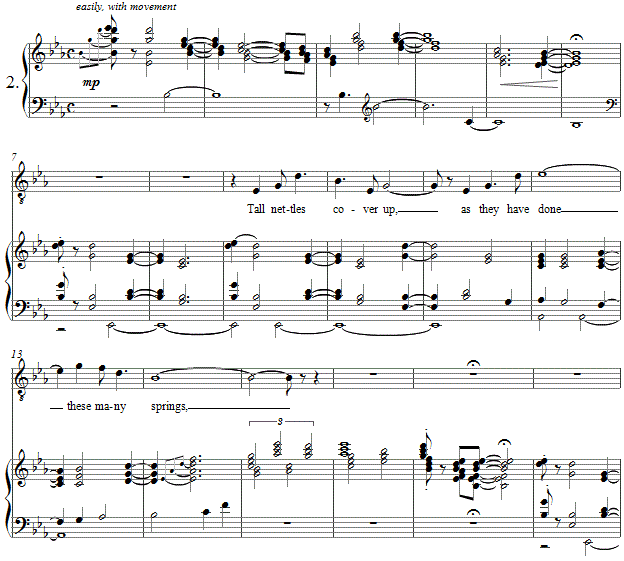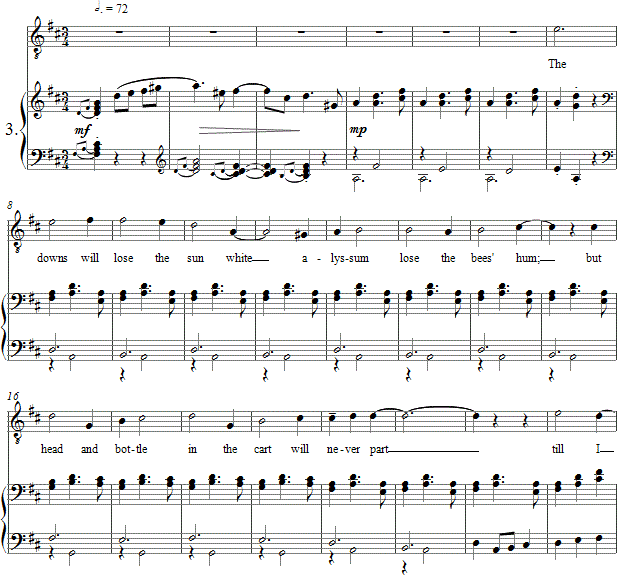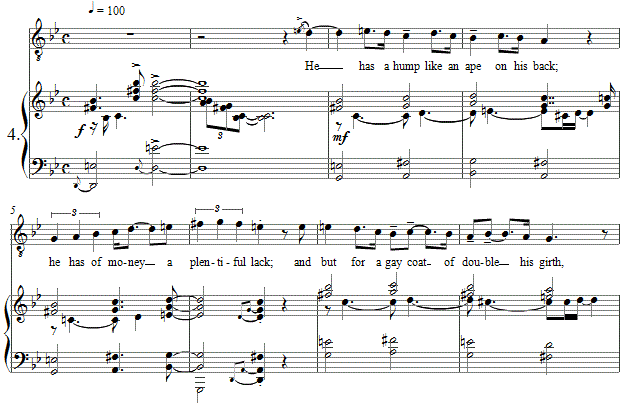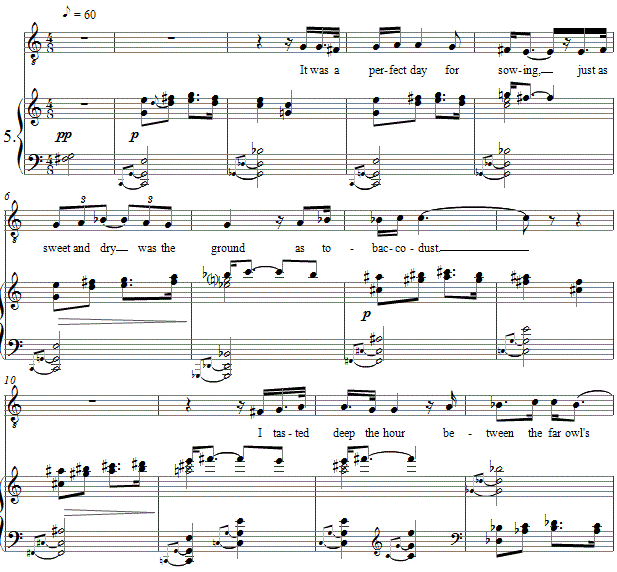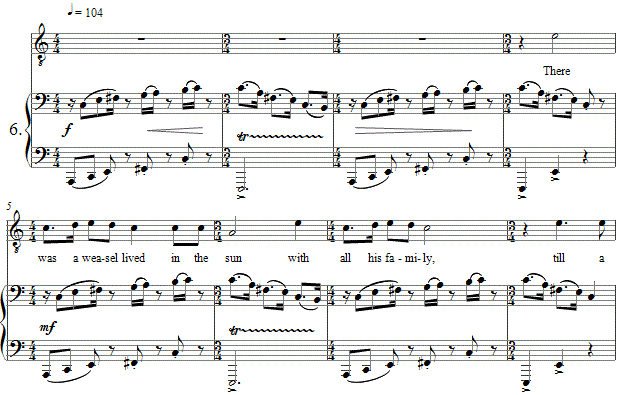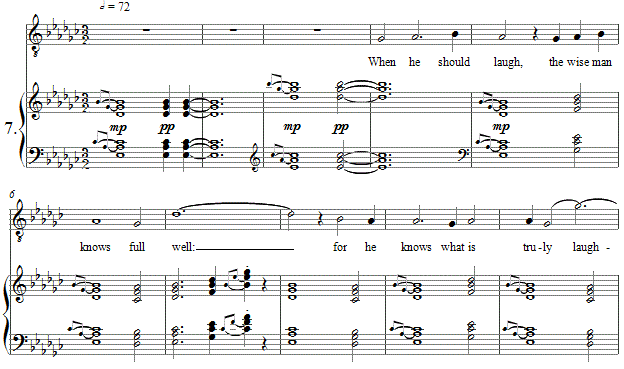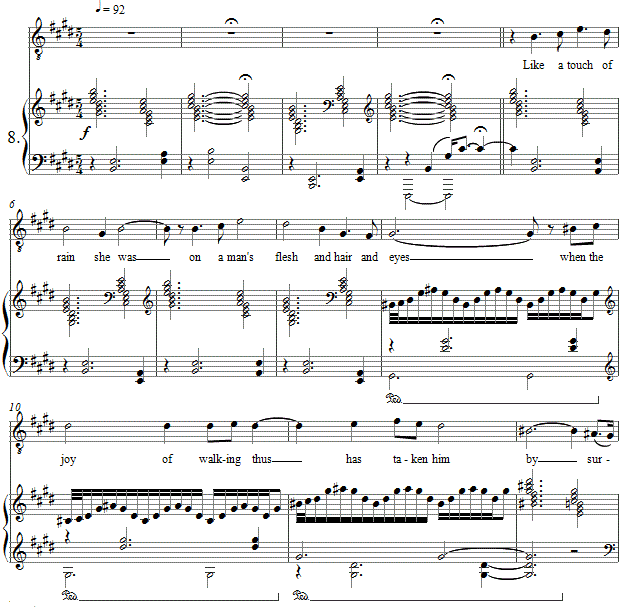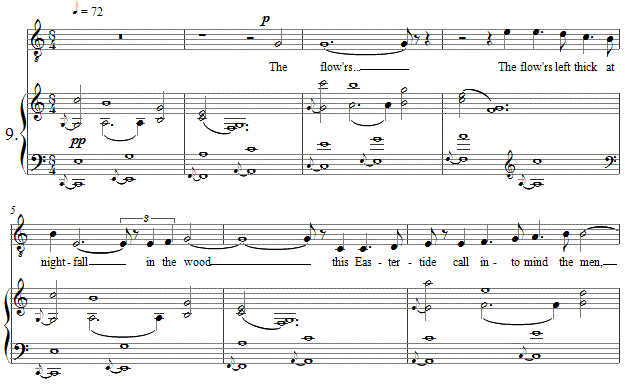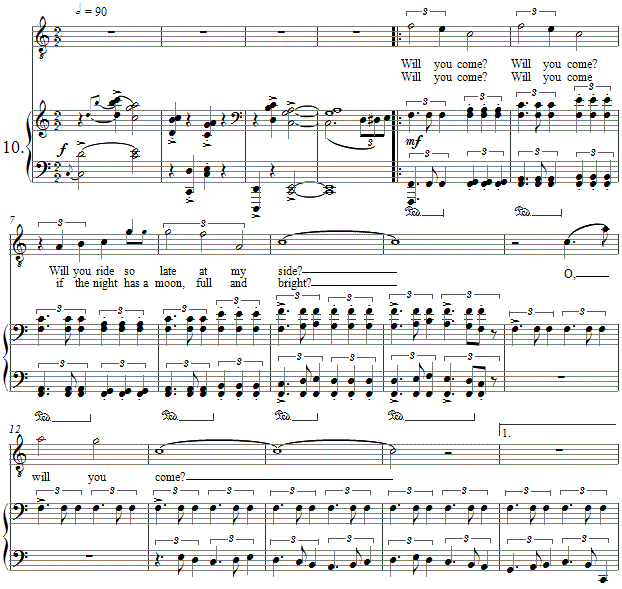Music and Texts of GARY BACHLUND
Vocal Music | Piano | Organ | Chamber Music | Orchestral | Articles and Commentary | Poems and Stories | Miscellany | FAQs
Ten Poems of Edward Thomas - (2010)
for tenor and piano
for Graham Clark
i. The Trumpet - [ 4 pages, circa 1' 45" ]
Rise up, rise up,
And, as the trumpet blowing
Chases the dreams of men,
As the dawn glowing
The stars that left unlit
The land and water,
Rise up and scatter
The dew that covers
The print of last night's lovers—
Scatter it, scatter it!
While you are listening
To the clear horn,
Forget, men, everything
On this earth newborn,
Except that it is lovelier
Than any mysteries.
Open your eyes to the air
That has washed the eyes of the stars
Through all the dewy night:
Up with the light,
To the old wars;
Arise, arise!
ii. Tall Nettles - [ 3 pages, circa 3' 10" ]
Tall nettles cover up, as they have done
These many springs, the rusty harrow, the plough
Long worn out, and the roller made of stone:
Only the elm butt tops the nettles now.
This corner of the farmyard I like most:
As well as any bloom upon a flower
I like the dust on the nettles, never lost
Except to prove the sweetness of a shower.
iii. Head and Bottle - [ 2 pages, circa 1' 00" ]
The downs will lose the sun, white alyssum
Lose the bees' hum;
But head and bottle tilted back in the cart
Will never part
Till I am cold as midnight and all my hours
Are beeless flowers.
He neither sees, nor hears, nor smells, nor thinks,
But only drinks,
Quiet in the yard where tree trunks do not lie
More quietly.
iv. The Huxter - [ 2 pages, circa 1' 30" ]
He has a hump like an ape on his back;
He has of money a plentiful lack;
And but for a gay coat of double his girth
There is not a plainer thing on the earth
This fine May morning.
But the huxter has a bottle of beer;
He drives a cart and his wife sits near
Who does not heed his lack or his hump;
And they laugh as down the lane they bump
This fine May morning.
v. Sowing - [ 2 pages, circa 2' 30" ]
It was a perfect day
For sowing; just
As sweet and dry was the ground
As tobacco-dust.
I tasted deep the hour
Between the far
Owl's chuckling first soft cry
And the first star.
A long stretched hour it was;
Nothing undone
Remained; the early seeds
All safely sown.
And now, hark at the rain,
Windless and light,
Half a kiss, half a tear,
Saying good-night.
vi. The Gallows - [ 5 pages, circa 2' 50" ]
There was a weasel lived in the sun
With all his family,
Till a keeper shot him with his gun
And hung him up on a tree,
Where he swings in the wind and rain,
In the sun and in the snow,
Without pleasure, without pain,
On the dead oak tree bough.
There was a crow who was no sleeper,
But a thief and a murderer
Till a very late hour; and this keeper
Made him one of the things that were,
To hang and flap in rain and wind,
In the sun and in the snow.
There are no more sins to be sinned
On the dead oak tree bough.
There was a magpie, too,
Had a long tongue and a long tail;
He could both talk and do—
But what did that avail?
He, too, flaps in the wind and rain
Alongside weasel and crow,
Without pleasure, without pain,
On the dead oak tree bough.
And many other beasts
And birds, skin, bone and feather,
Have been taken from their feasts
And hung up there together,
To swing and have endless leisure
In the sun and in the snow,
Without pain, without pleasure,
On the dead oak tree bough.
vii. When he should laugh - [ 1 page, circa 1' 00" ]
When he should laugh, the wise man knows full well:
For he knows what is truly laughable.
But wiser is the man who laughs also,
Or holds his laughter, when the foolish do.
viii. Like the touch of rain - [ 3 pages, circa 2' 30" ]
Like the touch of rain she was
On a man's flesh and hair and eyes
When the joy of walking thus
Has taken him by surprise:
With the love of the storm he burns,
He sings, he laughs, well I know how,
But forgets when he returns
As I shall not forget her "Go now."
Those two words shut a door
Between me and the blessed rain
That was never shut before
And will not open again.
ix. In Memoriam - [ 1 page, circa 1' 45" ]
The flowers left thick at nightfall in the wood
This Eastertide call into mind the men,
Now far from home, who, with their sweethearts, should
Have gathered them and will do never again.
x. Will you come? - [ 4 pages, circa 2' 00" ]
Will you come?
Will you come?
Will you ride
So late
At my side?
O, will you come?
Will you come?
Will you come
If the night
Has a moon,
Full and bright?
O, will you come?
Would you come?
Would you come
If the noon
Gave light,
Not the moon?
Beautiful, would you come?
Would you have come?
Would you have come
Without scorning,
Had it been
Still morning?
Beloved, would you have come?
If you come
Haste and come.
Owls have cried:
It grows dark
To ride.
Beloved, beautiful, come.[ 27 pages, circa 20' 00" ]
Edward Thomas
Edward Philip Thomas (1878–1917) was and English author and poet, who studied history at Oxford University. He was encouraged in his poetry after meeting American poet Robert Frost in 1913, and in the time of the First World War enlisted in the Army, worked in map-reading, and rose to the rank of lieutenant in charge of of a siege battery. Having volunteered for overseas service, he was killed by a shell blast while at an observation post directing fire. Buried in France, he is remembered in the Poet's Corner of Westminster Abbey in London. The poems I have chosen to set were published posthumously in 1917 under a pseudonym, Edward Eastaway, the collection dedicated to Robert Frost.
These were conceived for tenor and dedicated to Graham Clark, whom I met as we flew together on a British Airways flight from Heathrow to Berlin Tegel last month. This trip was odd for me, as I shared the other leg from the states to Europe with another singer of my acquaintance as well. I had chatted with Graham about my decision to set aside concertizing for retirement, and remarked that I was more than happy to spend the next portion of my life focused completely on composing. For that I suggested a song for him, but the circumstances of becoming deeply aware of the fine work of Edward Thomas urged me on, the idea of a song easily became a cycle, and insisted on this diversity of moods and textures, colors and forms.
i. The Trumpet
The opening announcement is fortissimo, and the voices rise with the verb and challenge of the poet to savor the world and its mysteries. The whole tone clusters insinuate a relationship of the augmented fourth between gestures flowing between the two harmonic poles. A center section falls away for a moment into a diatonic Lydian, before returning to the whole tone gestures rooted on C and F sharp.
ii. Tall Nettles
The brisk opening setting yields to a lyrical cantabile in E flat with four-note parallel chords.
iii. Head and Bottle
A moment of comic relief in D major comes with a drinking song, assuring that life is in part flavored with alcohol.
iv. The Huxter
From the previous D to G minor, this short portrait of an odd couple shifts moods again and a tiny refrain-like gesture "bumps" down the musical road.
v. Sowing
The previous G leans back toward C, and yet a recollection of the tri-tone relationship from the first setting flavors this polytonal setting in a long lined, slow setting.
vi. The Gallows
A darkening picture follows, portraying the "victims" of the keeper hanging and swaying in the wind. A shift between 4/4 and 3/4 and repetitive "hammer" insists on the gracelessness of this picture, and as the text comes to its "swaying" moments, the meter remains in a swinging 3/4, before each succeeding stanza repeats in a folk-song like manner, the A minor foil to the sweet C polytonal major which preceded it in the cycle.
vii. When he should laugh
The antidote to much is laughter, but the poet reminds us that wisdom is seen in part by knowing when to laugh. A gentle G flat breaks mood from the preceding A harmonic minor.
viii. Like the touch of rain
The poet reminds us of the disappointments in life, among them the disappointment in love. A lyrical, broad-lined E major lifts to G sharp and then returns to the more settled tonic in an arch between tonal regions and textures in the accompaniment.
ix. In Memoriam
The title of this poem is, in its place in the collection, In memoriam (Easter 1915). The reference to the war which was to claim the poet's life shortly is contrasted with the beauty of nature and of lovers, whose lives will become irreparably torn apart by the gruesome reality of war, with its "gallows" far more horrid than the poem earlier in this cycle pictures. I intentionally leave off the remainder of the title, for it is not 0f 1915 alone of which I think, but of the poet's own sacrifice as he saw his duty to fight for freedom and died thereby.
x. Will you come?
For all the contemplation of nature in its varied portraits and of war and loss, the poem of expectant love stands out as a beacon of hope and joy. The question posed repeatedly, we may be assured is filled with a love of life, in spite of the previous text's recollection of "Go now." Life and love as with death and loss complete a picture of man's condition with enthusiasm and musical energy.
Graham Clark
Graham Clark (b. 1941, Lancashire) is an English opera tenor, mainly known for character roles from Wagner to Berg. He has sung at major North American and European opera houses, including the Metropolitan Opera and Bayreuth Festival, and recorded for all the major labels.
The score for this song cycle is available as a free PDF download, though any major commercial performance or recording of the work is prohibited without prior arrangement with the composer. Click on the graphic below for this piano-vocal score.

